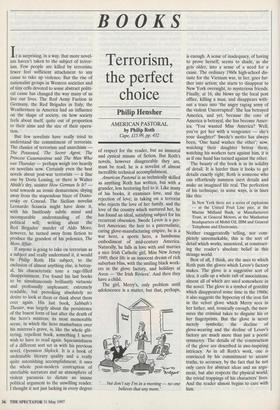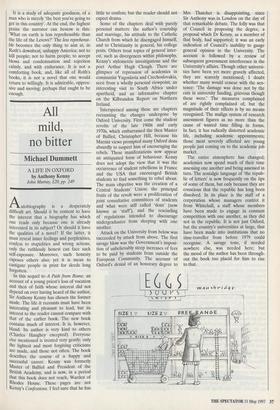BOOKS
Terrorism, the perfect choice
Philip Hensher
AMERICAN PASTORAL by Philip Roth Cape, £15.99, pp. 432
It is surprising, in a way, that more novel- ists haven't taken to the subject of terror- ism. Few people are killed by terrorists; fewer feel sufficient attachment to any cause to take up violence. But the rise of nationalist groups in Western societies and of tiny cells devoted to some abstract politi- cal cause has changed the way many of us live our lives. The Red Army Faction in Germany, the Red Brigades in Italy, the Weathermen in America had an influence on the shape of society, on how society feels about itself, quite out of proportion to their aims and the size of their opera- tion.
But few novelists have really tried to understand the commitment of terrorists. The classics of terrorism and anarchism The Possessed, The Secret Agent, The Princess Casamassima and The Man Who was Thursday — perhaps weigh too heavily on novelists now. Certainly even the best novels about post-war terrorists — a fine one by Doris Lessing, or there is Walter Abish's dry, sinister How German Is It? tend towards an ironic demureness, shying away from the stupendous blaze of Dosto- evsky or Conrad. The Sicilian novelist Leonardo Sciascia might have done it, with his limitlessly subtle mind and incomparable understanding of the political will; writing about the Red Brigades' murder of Aldo Moro, however, he turned away from fiction to produce the grandest of his polemics, The Moro Affair.
If anyone is going to take on terrorism as a subject and really understand it, it would be Philip Roth. His subject, to the exclusion of almost anything else, is betray- al, his characteristic tone a rage-filled disappointment. I've found his last books to be simultaneously brilliantly virtuosic and profoundly unpleasant; extremely readable, but provoking absolutely no desire to look at them or think about them ever again. His last book, Sabbath's Theater, was largely about the persistence of the basest form of lust after the death of the hero's mistress; its most memorable scene, in which the hero masturbates over his mistress's grave, is, like the whole glit- tering, repellent book, something I never wish to have to read again. Squeamishness of a different sort set in with his previous novel, Operation Shylock. It is a book of undeniable literary quality and a really quite astonishing accomplishment; it uses the whole post-modern contraption of unreliable narrators and an atmosphere of violent paranoia to dictate an insane political argument to the unwilling reader. I thought it not just lacking in every degree of respect for the reader, but an immoral and cynical misuse of fiction. But Roth's novels, however disagreeable they are, must be read; he is a novelist of almost incredible technical accomplishment.
American Pastoral is as technically skilled as anything Roth has written, but with a grander, less hectoring feel to it. Like many of his books, it examines love, and the rejection of love; in taking on a terrorist who rejects the love of her family, and the love of the country which nurtured her, he has found an ideal, satisfying subject for his recurrent obsession. Swede Levov is a per- fect American; the heir to a paternalistic, caring glove-manufacturing empire, he is a war hero, a sports hero, a handsome embodiment of mid-century America. Naturally, he falls in love with and marries a nice Irish Catholic girl, Miss New Jersey 1949; their life is an innocent dream of rich suburban bliss, with the smiling black work- ers in the glove factory, and holidays at Avon — 'the Irish Riviera'. And then they have a child.
The girl, Merry's, only problem until adolescence is a stutter, but that, perhaps, . but don't say I'm in a meeting — no one
believes that any more.' is enough. A sense of inadequacy, of having to prove herself, seems to shade, as she gets older, into a sense of a need for a cause. The ordinary 1960s high-school dis- taste for the Vietnam war, in her, goes fur- ther into action; she starts to disappear to New York overnight, to mysterious friends. Finally, at 16, she blows up the local post office, killing a man, and disappears with- out a trace into 'the angry ragtag army of the violent Uncorrupted'. She has betrayed America, and yet, because the core of America is betrayal, she has become Amer- ica. 'You wanted Miss America? Well, you've got her with a vengeance — she's your daughter!' Swede's motto has always been, 'One hand washes the other'; now, watching their daughter betray them, watching his workers turn against him, it is as if one hand has turned against the other.
The beauty of the book is in its solidity of detail. It is harder than it looks to get details exactly right; Roth is someone who can effortlessly summon inert details and make an imagined life real. The perfection of his technique, in some ways, is in lines like this:
In New York there are a series of explosions — at the United Fruit Line pier, at the Marine Midland Bank, at Manufacturers Trust, at General Motors, at the Manhattan headquarters of Mobil Oil, IBM and General Telephone and Electronics.
Neither exaggeratedly telling, nor com- pletely unremarkable, this is the sort of detail which works, unnoticed, at construct- ing the reader's absolute belief in this strange world.
Best of all, I think, are the uses to which Roth puts the gloves which Levov's factory makes. The glove is a suggestive sort of idea; it calls up a whole raft of associations, almost all of which are used somewhere in the novel. The glove is a symbol of gentility which disappeared some time in the 1960s; it also suggests the hypocrisy of the iron fist in the velvet glove which Merry sees in her father, and, ironically enough, the mea- sures the criminal takes to disguise his or her fingerprints. But the glove is never merely symbolic; the decline of glove-wearing and the decline of Levov's factory are much more than just a poetic symmetry. The details of the construction of the glove are described in awe-inspiring intricacy. As in all Roth's work, one is convinced by his commitment to arcane truths, to accuracy, by the fact that he not only cares for abstract ideas and an argu- ment, but also respects the physical world, the trivial trappings of his characters' lives. And the reader almost begins to care with him. It is a study of adequate goodness, of a man who is merely 'the best you're going to get in this country'. At the end, the highest praise the narrator can bestow is this: `What on earth is less reprehensible than the life of the Levovs?' The less reprehensi- ble becomes the only thing to aim at, in Roth's downbeat, unhappy America; not to kill people; not to harm people; to accept blows and condemnation and rejection calmly, and with endurance. It is not a comforting book, and, like all of Roth's books, it is not a novel that one would return to willingly. It is admirable, oppres- sive and moving; perhaps that ought to be enough.



































































 Previous page
Previous page